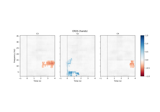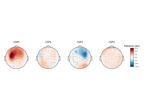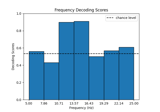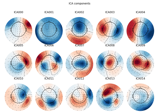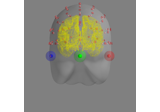mne.datasets.eegbci.load_data¶
-
mne.datasets.eegbci.load_data(subject, runs, path=None, force_update=False, update_path=None, base_url='https://physionet.org/files/eegmmidb/1.0.0/', verbose=None)[source]¶ Get paths to local copies of EEGBCI dataset files.
This will fetch data for the EEGBCI dataset [1], which is also available at PhysioNet [2].
- Parameters
- subject
int The subject to use. Can be in the range of 1-109 (inclusive).
- runs
int|listofint The runs to use. The runs correspond to:
run
task
1
Baseline, eyes open
2
Baseline, eyes closed
3, 7, 11
Motor execution: left vs right hand
4, 8, 12
Motor imagery: left vs right hand
5, 9, 13
Motor execution: hands vs feet
6, 10, 14
Motor imagery: hands vs feet
- path
None|str Location of where to look for the EEGBCI data storing location. If None, the environment variable or config parameter
MNE_DATASETS_EEGBCI_PATHis used. If it doesn’t exist, the “~/mne_data” directory is used. If the EEGBCI dataset is not found under the given path, the data will be automatically downloaded to the specified folder.- force_updatebool
Force update of the dataset even if a local copy exists.
- update_pathbool |
None If True, set the MNE_DATASETS_EEGBCI_PATH in mne-python config to the given path. If None, the user is prompted.
- verbosebool,
str,int, orNone If not None, override default verbose level (see
mne.verbose()and Logging documentation for more). If used, it should be passed as a keyword-argument only.
- subject
- Returns
- paths
list List of local data paths of the given type.
- paths
Notes
For example, one could do:
>>> from mne.datasets import eegbci >>> eegbci.load_data(1, [4, 10, 14], os.getenv('HOME') + '/datasets')
This would download runs 4, 10, and 14 (hand/foot motor imagery) runs from subject 1 in the EEGBCI dataset to the ‘datasets’ folder, and prompt the user to save the ‘datasets’ path to the mne-python config, if it isn’t there already.
References
- 1
Schalk, G., McFarland, D.J., Hinterberger, T., Birbaumer, N., Wolpaw, J.R. (2004) BCI2000: A General-Purpose Brain-Computer Interface (BCI) System. IEEE TBME 51(6):1034-1043
- 2
Goldberger AL, Amaral LAN, Glass L, Hausdorff JM, Ivanov PCh, Mark RG, Mietus JE, Moody GB, Peng C-K, Stanley HE. (2000) PhysioBank, PhysioToolkit, and PhysioNet: Components of a New Research Resource for Complex Physiologic Signals. Circulation 101(23):e215-e220
